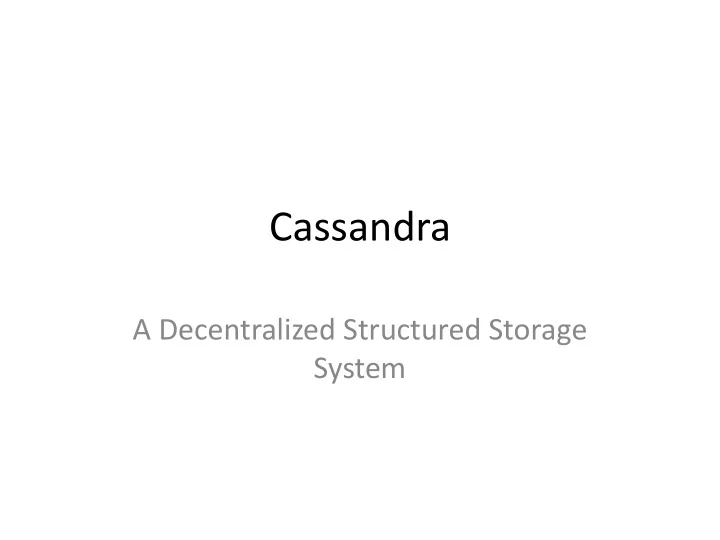

Cassandra A Decentralized Structured Storage System
Motivation • Facebook Inbox search: – Billions of write per day – Geographical distribution of servers and users
Data Model • A table is a distributed multi-dimensional map indexed by a key • Columns are grouped together into sets called column families
API • insert(table,key,rowMutation) • get(table,key,columnName) • insert(table,key,columnName)
System Architecture: Partitioning • Partitions data across the cluster using consistent hashing • Each node in the system is assigned a random value on the ring space • A data item belong on the first node with a position larger than the item’s position • Only direct neighbour affected by a node • Incoming node alleviate heavily loaded nodes
System Architecture: Replication • Each data item is replicated at N hosts • Coordinator node is in charge of the replication of the data • “Rack Unaware”: use N -1 successors • “Rack Aware” or “Data Centre Aware”: nodes elect a leader who assigns a replica range to every node
System Architecture: Membership • Membership is based on Scuttlebutt: an anti- entropi Gossip based mechanism • Use Failure detection to avoid attempts to communicate with unreachable nodes
System Architecture: Bootstrapping • When a node starts for the first time, it chooses a random token for its position in the ring • This information is then gossiped • When a node needs to join the cluster, it reads its configuration file which contains a few contact points within the cluster
System Architecture: Scaling • When a new node is added, it gets assigned a token such that it can alleviate a heavily loaded node.
System Architecture: Local Persistence • Write: – Use an in-memory data structure – Write to in-memory only performed after successful write into a commit log – When the in-memory data structure goes over a threshold, it dumps itself to disk • Read: – First look at in-memory data – Then check a bloom filter for each file in which the key could be
Recommend
More recommend